Foods Gastroenterologists Avoid for Gut Health
Gut health concerns over 60 million Americans each year, according to the CDC. The gastrointestinal system plays a vital role in overall health, from immunity to nutrient absorption. Yet, the onset of digestive issues can be subtle, making them easy to overlook until symptoms worsen. Understanding which foods may trigger or exacerbate gut problems is crucial. This article explores which foods gastroenterologists themselves avoid to protect and promote optimal digestive health.
1. Processed Meats

Processed meats such as hot dogs, bacon, sausage, and deli meats are commonly avoided by gastroenterologists due to their negative impact on gut health. These foods often contain high levels of additives, preservatives, and sodium, including nitrates and nitrites, which have been shown to disrupt the balance of beneficial gut bacteria. According to the World Health Organization, processed meats are also classified as carcinogenic, increasing the risk of colorectal cancer.
The altered gut microbiome caused by frequent processed meat consumption can lead to inflammation, digestive discomfort, and a weakened immune system. Moreover, these meats are typically low in fiber, which is essential for maintaining a healthy digestive tract. Gastroenterologists recommend limiting intake of processed meats as much as possible. Instead, opt for lean, unprocessed protein sources such as grilled chicken, turkey, fish, legumes, or plant-based proteins. If you do eat meat, choose minimally processed options and look for nitrate-free labels. For more information on healthy meat choices, visit the Harvard T.H. Chan School of Public Health.
2. Artificial Sweeteners
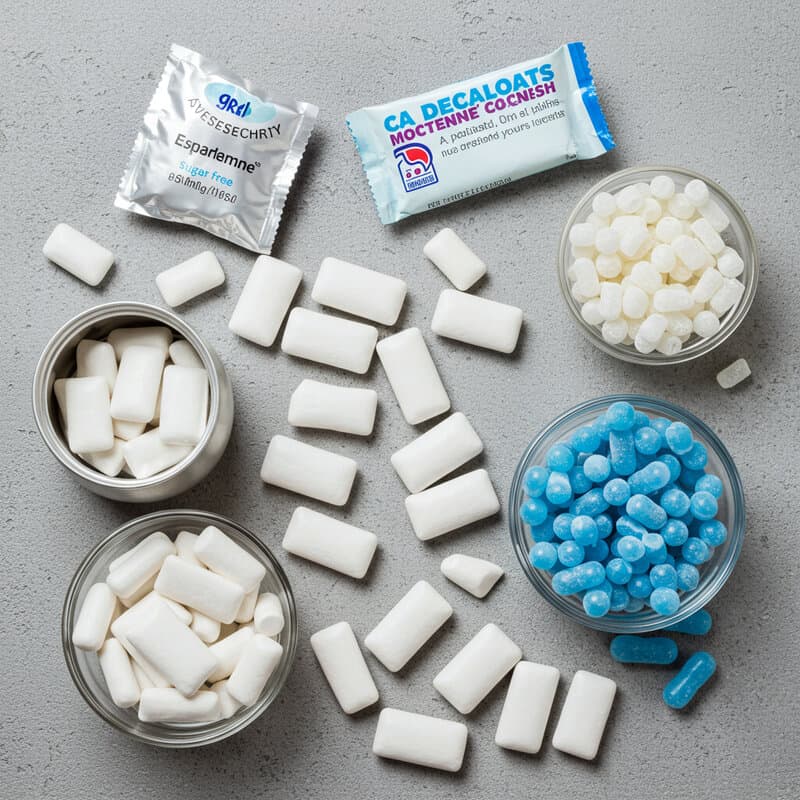
Artificial sweeteners, commonly found in products like diet sodas, sugar-free gum, and low-calorie desserts, are often avoided by gastroenterologists due to their disruptive impact on gut microbiota. Research published in Nature has shown that sweeteners such as aspartame, sucralose, and saccharin can negatively alter the composition and function of beneficial gut bacteria, potentially leading to glucose intolerance and digestive disturbances.
Frequent consumption of these sugar substitutes may contribute to bloating, gas, and changes in bowel habits for sensitive individuals. Gastroenterologists advise their patients to be vigilant about reading labels, as artificial sweeteners can be listed under various names, including “acesulfame potassium,” “sucralose,” and “aspartame.” For those seeking alternatives, natural sweeteners like honey, maple syrup, or stevia are generally considered gentler on the digestive system, though they should still be used in moderation. For more information on the effects of artificial sweeteners, visit the Harvard Health Blog. By choosing natural options and limiting artificial additives, individuals can better support the delicate balance of their gut microbiome.
3. Fried Foods

Fried foods, including popular items like French fries, fried chicken, and onion rings, are known to be particularly harsh on the digestive system. Gastroenterologists often avoid these foods because their high fat content can slow down digestion, leading to uncomfortable symptoms such as bloating, heartburn, and indigestion. Additionally, frying at high temperatures produces compounds that may irritate and damage the gut lining, further contributing to inflammation and gastrointestinal discomfort.
According to the Cleveland Clinic, regularly consuming fried foods is linked to an increased risk of developing chronic digestive issues, such as acid reflux and irritable bowel syndrome (IBS). The heavy and greasy nature of these foods makes them difficult to break down, causing the digestive tract to work overtime. Gastroenterologists recommend enjoying fried foods only in moderation and exploring healthier cooking methods, such as baking, grilling, or air frying, which use less oil and maintain the nutritional value of foods. For more tips on digestive-friendly cooking, visit the Academy of Nutrition and Dietetics.
4. High-Fructose Corn Syrup
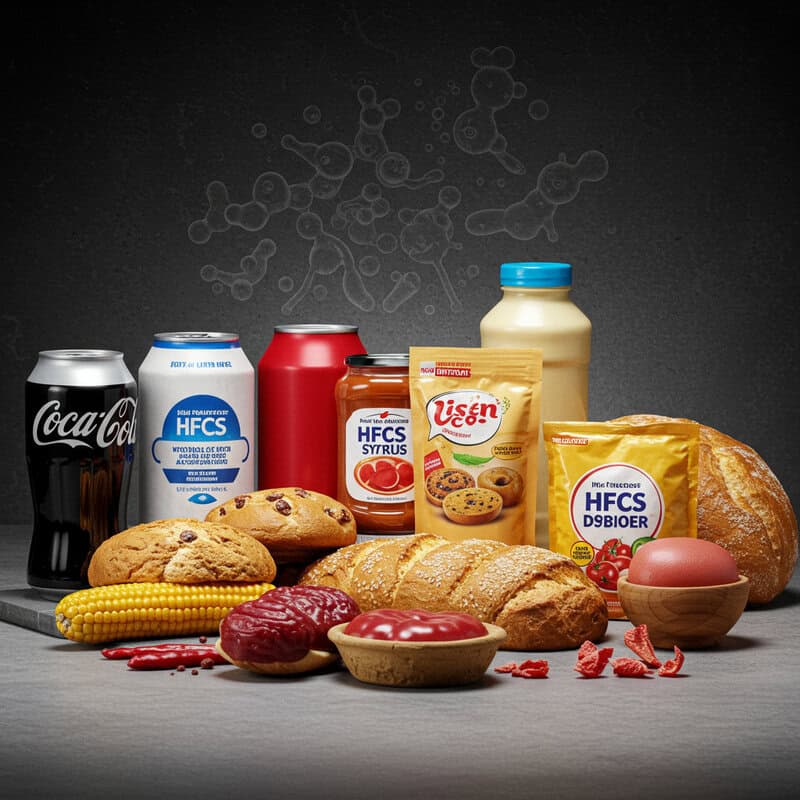
High-fructose corn syrup (HFCS) is a common sweetener found in many processed foods and beverages, such as sodas, baked goods, and condiments. Gastroenterologists avoid HFCS because it has been shown to promote inflammation and disrupt the natural balance of gut bacteria, a condition known as gut dysbiosis. Studies, including one cited by the National Institutes of Health, indicate that excessive intake of HFCS can increase intestinal permeability, often referred to as “leaky gut,” and may contribute to metabolic disorders.
Unlike naturally occurring sugars found in fruits and vegetables, HFCS is rapidly absorbed and metabolized, which can overwhelm the digestive system and encourage the growth of harmful bacteria. This differs significantly from the way the body processes natural sugars, which are accompanied by fiber, vitamins, and antioxidants that help moderate their impact. To protect gut health, experts recommend carefully reading ingredient lists on packaged foods and choosing products sweetened with natural sources such as honey or fruit puree. For more guidance on avoiding high-fructose corn syrup and its effects, visit the American Heart Association.
5. Red Meat (in Excess)

Excessive consumption of red meat, such as steak, burgers, and pork, is increasingly linked to the production of harmful gut metabolites like trimethylamine N-oxide (TMAO). Research from the Cleveland Clinic highlights that diets heavy in red meat can alter the gut microbiome, promoting bacteria that produce these metabolites. Elevated TMAO levels are associated with inflammation, increased risk of cardiovascular disease, and potential disruptions to digestive health.
People who consume red meat frequently, especially in large portions, may experience greater gut strain and increased likelihood of gastrointestinal discomfort or long-term issues. Compared to plant-based proteins, red meat lacks fiber, which is crucial for supporting beneficial gut bacteria. Gastroenterologists advise practicing portion control—limiting red meat to a few servings per week and choosing leaner cuts. Incorporating plant proteins like beans, lentils, tofu, and quinoa can help diversify the diet, increase fiber intake, and foster a healthier gut environment. For more information on balancing red meat consumption and gut health, visit the World Cancer Research Fund.
6. Dairy (for the Lactose Intolerant)

Lactose intolerance occurs when the body lacks sufficient lactase, an enzyme needed to digest lactose—the sugar found in milk and dairy products. For individuals with this condition, consuming foods like milk, cheese, or ice cream can lead to uncomfortable digestive symptoms such as bloating, gas, diarrhea, and abdominal pain. According to the National Institute of Diabetes and Digestive and Kidney Diseases (NIDDK), lactose intolerance affects up to 65% of the global population, with prevalence varying widely among different ethnic groups.
Populations of East Asian, West African, and Indigenous American descent tend to have higher rates of lactose intolerance compared to people of Northern European ancestry, who are more likely to tolerate dairy. Gastroenterologists advise those with lactose intolerance to avoid or limit traditional dairy products. Fortunately, there are many alternatives, such as lactose-free milk, almond milk, and soy-based yogurts, which provide similar nutrients without triggering symptoms. In cases where dairy is desired, over-the-counter lactase enzyme supplements can help improve digestion. For further information on managing lactose intolerance and exploring dairy alternatives, visit the Mayo Clinic.
7. Alcohol (Excessive)
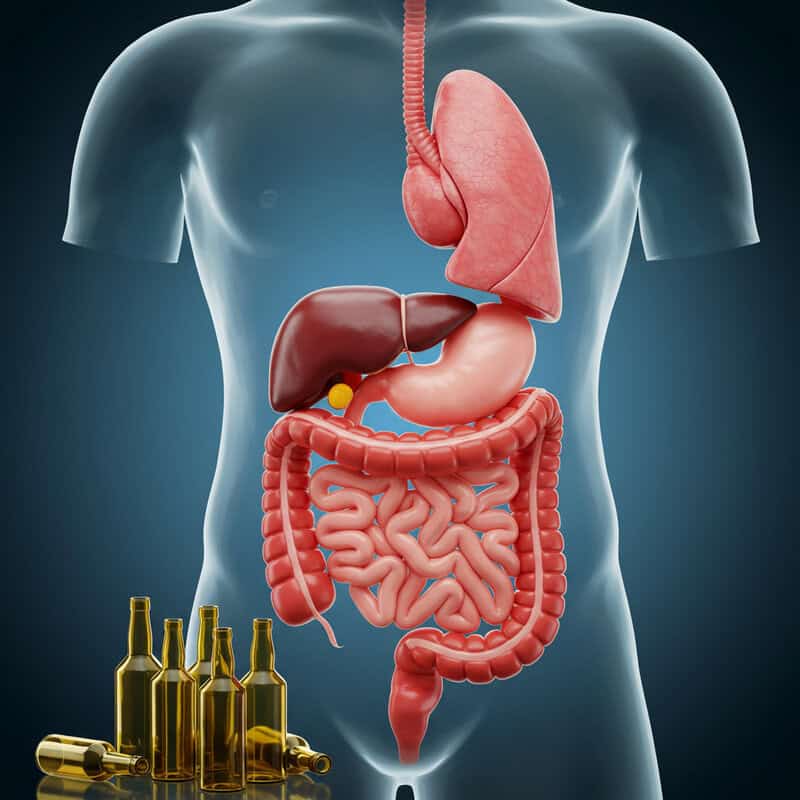
Excessive alcohol consumption is well known for its damaging effects on gut health. Alcohol can irritate the gut lining, increase intestinal permeability (“leaky gut”), and disrupt the balance of beneficial bacteria. Binge drinking—often defined as consuming four or more drinks in a short period for women, or five or more for men—can lead to inflammation and weaken the gut’s barrier function, allowing harmful substances to pass into the bloodstream. This not only impacts digestion but also impairs immune response and increases the risk of liver disease.
Research from the National Institutes of Health highlights how chronic heavy drinking alters the gut microbiome, fostering the overgrowth of harmful bacteria while depleting protective species. Gastroenterologists caution that even moderate alcohol use can trigger symptoms in sensitive individuals, such as bloating or diarrhea. To protect gut health, experts advise limiting alcohol intake to no more than one drink per day for women and two for men, drinking plenty of water to stay hydrated, and choosing alcohol-free days each week. For additional tips on alcohol moderation and digestive health, visit the CDC’s moderate drinking guidelines.
8. Carbonated Beverages
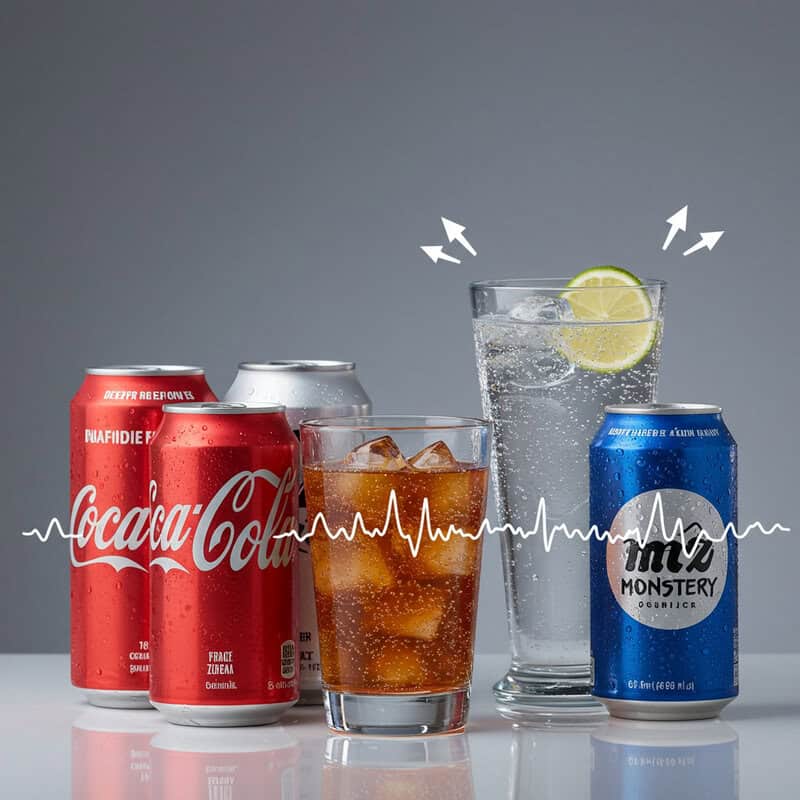
Carbonated beverages, such as sodas, sparkling water, and fizzy energy drinks, can cause significant bloating and digestive discomfort, particularly for those with sensitive stomachs. The carbonation introduces carbon dioxide gas into the digestive tract, which can lead to the buildup of gas, resulting in abdominal bloating, belching, and even pain. Gastroenterologists often caution patients who experience frequent digestive discomfort or conditions like irritable bowel syndrome (IBS) to limit their intake of fizzy drinks.
Compared to flat drinks—such as still water, herbal tea, or diluted juice—carbonated beverages are more likely to trigger symptoms in individuals prone to gastrointestinal distress. Additionally, sodas often contain added sugars or artificial sweeteners, which can further disrupt gut health. For those who enjoy flavored drinks but want to avoid carbonation, alternatives like infused water with fresh fruit, herbal teas, or coconut water can be gentler on the digestive system. For more information on the effects of carbonated beverages and managing bloating, visit the American Gastroenterological Association. Choosing flat, non-caffeinated, and low-sugar drinks is often recommended for maintaining optimal digestive comfort and gut health.
9. Spicy Foods
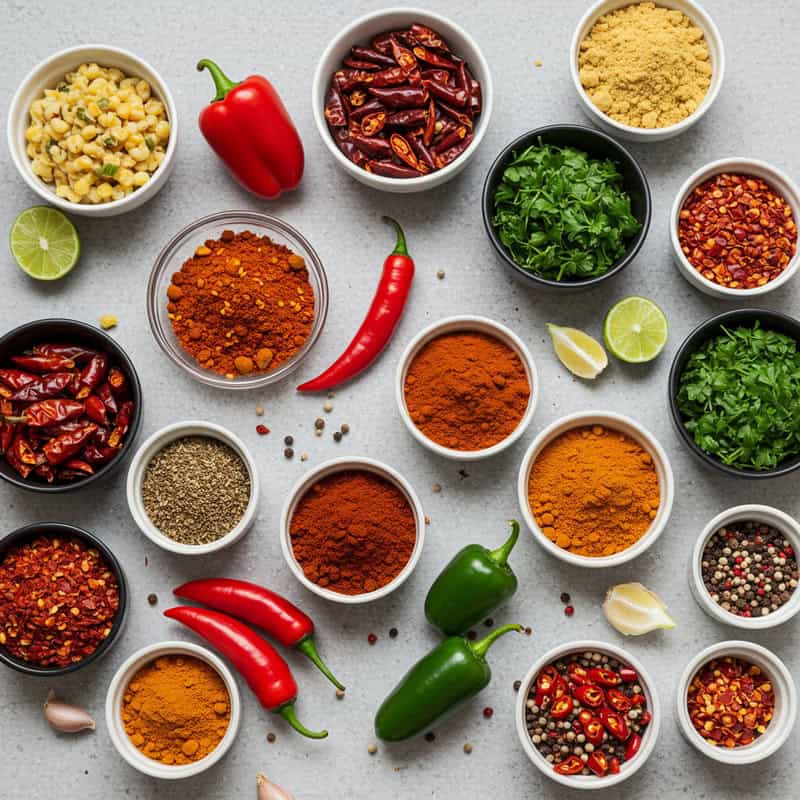
Spicy foods, including dishes made with hot peppers, chili powder, and strong seasonings, are common triggers for heartburn and acid reflux. These foods can irritate the lining of the esophagus and stomach, leading to a burning sensation in the chest and throat. For individuals with gastroesophageal reflux disease (GERD) or sensitive digestive systems, spicy meals may worsen symptoms and contribute to discomfort after eating. Capsaicin, the compound that gives hot peppers their heat, can also speed up gut motility, sometimes resulting in diarrhea or cramping for those who are sensitive.
According to the Cedars-Sinai Medical Center, managing spice levels is key for those prone to digestive issues. Tips include starting with milder spices, pairing spicy foods with cooling ingredients like yogurt or avocado, and gradually increasing tolerance over time. Removing seeds from peppers and choosing less potent varieties can also help reduce irritation. If symptoms persist, it may be beneficial to limit or avoid spicy foods altogether. For more guidance on managing dietary triggers for acid reflux and heartburn, visit the Mayo Clinic GERD resource.
10. Sugar Alcohols

Sugar alcohols, such as sorbitol, xylitol, and mannitol, are common ingredients in sugar-free candies, gum, protein bars, and some low-calorie processed foods. Gastroenterologists often avoid these sweeteners because they can have a pronounced laxative effect. Unlike traditional sugars, sugar alcohols are only partially absorbed in the small intestine, allowing them to reach the colon where they are fermented by gut bacteria. This fermentation process can produce gas, bloating, cramping, and, in higher amounts, diarrhea.
For sensitive individuals, consuming just a few sugar-free candies or gum containing sugar alcohols like sorbitol can quickly cause gastrointestinal distress. Regular candies, while higher in sugar, do not typically have the same laxative effect, though they should still be eaten in moderation for overall health. To avoid unwanted digestive symptoms, it’s important to check ingredient lists for terms like “sorbitol,” “mannitol,” “xylitol,” and “isomalt.” For more on the digestive effects of sugar alcohols and how to identify them, visit the U.S. Food and Drug Administration’s guide. Choosing natural sweeteners and limiting processed sugar-free products can help protect gut comfort and function.
11. Fast Food

Fast food is often characterized by high levels of unhealthy fats, sodium, and simple carbohydrates, while being low in fiber and essential nutrients. Common examples like burgers, fries, and fried chicken are notorious for their negative impact on gut health. The high fat content in these meals can slow digestion, increase inflammation, and disrupt the balance of gut bacteria. Additionally, the lack of fiber in most fast food options deprives beneficial bacteria of the fuel they need to thrive, which can contribute to digestive problems and an increased risk of chronic disease.
Studies published by the National Institutes of Health link frequent fast food consumption to higher rates of gastrointestinal discomfort, obesity, and metabolic disorders. Gastroenterologists often recommend limiting fast food intake and opting for home-cooked alternatives, which allow for greater control over ingredients and preparation methods. Preparing meals at home using lean proteins, whole grains, and plenty of vegetables can help maintain a healthy gut microbiome. For ideas on nutritious, gut-friendly meals to make at home, visit EatRight.org from the Academy of Nutrition and Dietetics.
12. Cured and Smoked Meats
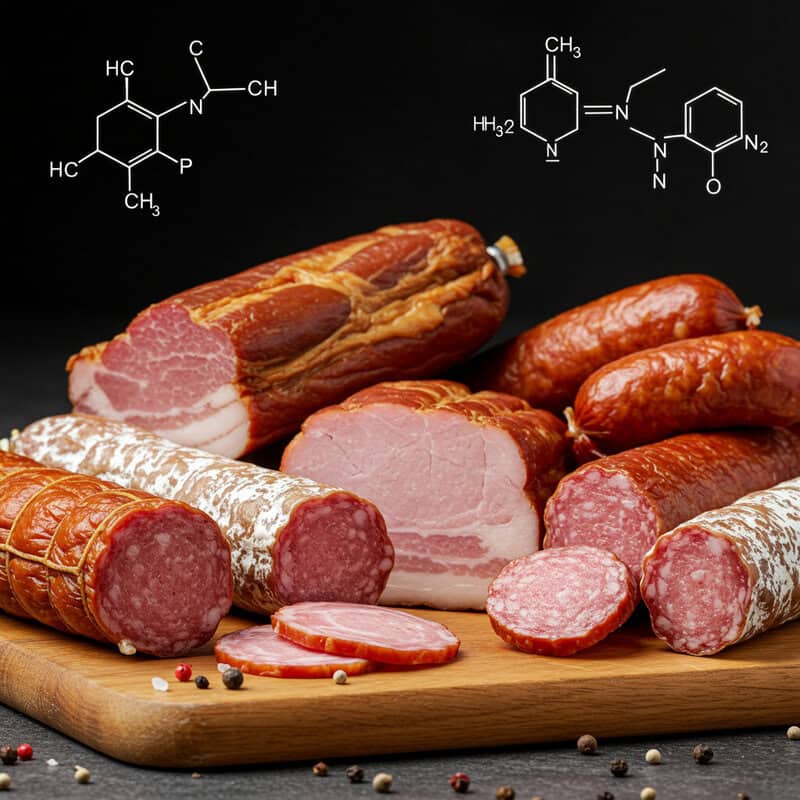
Cured and smoked meats—such as smoked bacon, salami, ham, and certain sausages—are frequently avoided by gastroenterologists due to their high levels of nitrites and nitrates. These chemical preservatives are used to enhance flavor and extend shelf life, but they can form potentially carcinogenic compounds called nitrosamines during the curing or smoking process. According to the American Cancer Society, regular consumption of processed meats is linked to an increased risk of colorectal cancer and other digestive issues.
Compared to fresh cuts of meat, such as unseasoned chicken breast or pork loin, smoked and cured varieties often contain more sodium and chemical additives, which can disrupt the gut microbiota and increase the likelihood of inflammation. Gastroenterologists recommend limiting intake of processed meats as much as possible and choosing fresh, unprocessed options instead. For those seeking alternatives, look for products labeled “uncured” or “no added nitrites or nitrates,” and focus on incorporating more plant-based proteins. For more information on processed meats and digestive health, visit the World Cancer Research Fund.
13. Pickled Foods (with Excess Sodium)
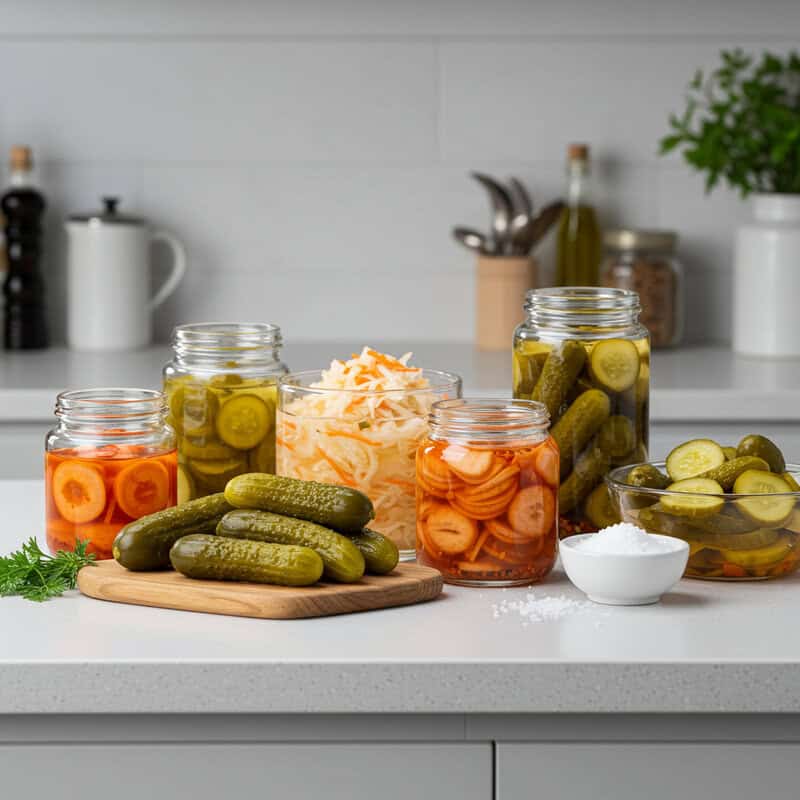
Pickled foods like pickles, sauerkraut, and kimchi are often praised for their probiotic benefits, but gastroenterologists caution against varieties high in sodium. Excess salt is commonly used in commercial pickling processes to preserve and flavor foods, but consuming too much sodium can damage the gut lining and upset fluid balance in the digestive tract. According to the Centers for Disease Control and Prevention (CDC), high sodium intake is linked to inflammation and increased risk of hypertension, both of which can negatively impact gut health.
While fermented foods can support a healthy microbiome, those with excessive salt content may counteract these benefits, particularly for individuals with sensitive digestive systems or those prone to bloating and water retention. Gastroenterologists recommend choosing low-sodium or reduced-salt versions of pickled foods and rinsing them before eating to further decrease sodium intake. Additionally, homemade pickling allows for better control over salt levels. For more on the effects of sodium on gut and overall health, visit the American Heart Association’s sodium guidelines. Prioritizing lower-sodium pickled options helps maintain both gut and cardiovascular health.
14. Refined Grains
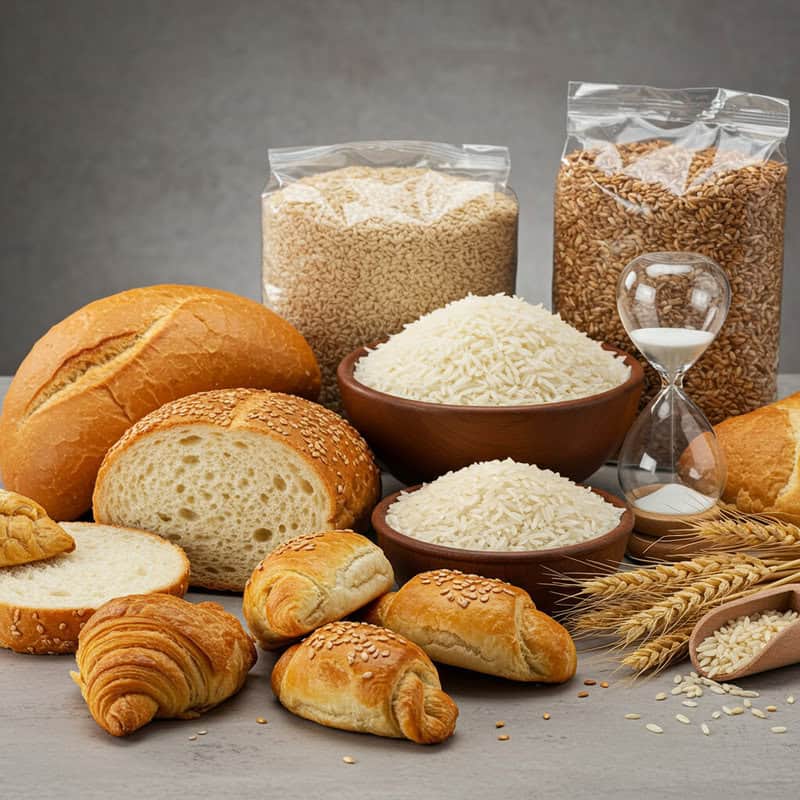
Refined grains, such as white bread, white rice, and many pastries, have been stripped of their fiber-rich bran and nutrient-dense germ during processing. This results in products with a high glycemic index that are rapidly digested and absorbed, leading to spikes in blood sugar and less sustained energy. Gastroenterologists often avoid these foods because their low fiber content fails to adequately nourish beneficial gut bacteria, which rely on dietary fiber for growth and activity. The lack of fiber also slows digestive transit, potentially causing constipation and other discomforts.
In contrast, whole grain products like whole wheat bread, brown rice, and oats retain their natural fiber, vitamins, and minerals. According to the Harvard T.H. Chan School of Public Health, swapping refined grains for whole grains is linked to improved digestive health, better blood sugar control, and a lower risk of chronic disease. To support optimal gut health, experts recommend reading ingredient labels and choosing products that list whole grains as the first ingredient. For more guidance on making whole grain swaps and their health benefits, visit the ChooseMyPlate.gov grains resource.
15. Chewing Gum (with Sorbitol)

Chewing gum, especially sugar-free varieties, often contains sugar alcohols like sorbitol and xylitol. Gastroenterologists are cautious about these ingredients because when consumed in significant amounts, sugar alcohols can cause bloating, gas, and even diarrhea. Sorbitol, in particular, is only partially absorbed in the small intestine, allowing it to reach the colon where it is fermented by bacteria, producing excess gas and discomfort. This effect is well-documented by the National Institutes of Health, which notes that even moderate gum chewing can quickly add up in terms of sorbitol intake.
Sugar-free gum is often favored for oral health, but regular consumption can lead to unwanted digestive symptoms, especially for sensitive individuals. In contrast, regular gum sweetened with sugar does not have the same laxative effect but carries the risk of cavities and other dental issues. For those looking to freshen breath without irritating the gut, alternatives include natural breath fresheners like parsley, fennel seeds, or mints made without sugar alcohols. For more information on the digestive effects of sugar alcohols and alternative options, visit the FDA’s Sugar Alcohols resource.
16. Energy Drinks

Energy drinks are notorious for containing high levels of caffeine and added sugars, which can be particularly harsh on the digestive system. Many popular brands pack as much as 200 mg or more of caffeine per serving—often alongside stimulants like taurine and guarana—and significant amounts of sugar. Such a combination can overstimulate the gastrointestinal tract, leading to symptoms like diarrhea, cramping, and acid reflux. The sugar overload may also disrupt the gut microbiome and contribute to inflammation when consumed regularly.
Compared to coffee, which typically contains fewer additives and a more moderate dose of caffeine per serving, energy drinks deliver a concentrated jolt that is harder for the body to process. According to the Centers for Disease Control and Prevention (CDC), excessive energy drink consumption is linked to gastrointestinal upset, dehydration, and even serious heart issues. Gastroenterologists advise limiting or avoiding energy drinks altogether, opting instead for plain coffee, herbal tea, or naturally flavored water for an energy boost. For more information on the health risks associated with energy drinks, visit the FDA’s consumer update on energy drinks.
17. Ice Cream (for Lactose Intolerant)

Ice cream is a beloved dessert, but for those who are lactose intolerant, it can cause significant digestive distress. Ice cream contains high levels of lactose, the natural sugar found in milk and dairy products. Individuals who lack sufficient lactase enzyme struggle to digest lactose, resulting in symptoms like bloating, gas, stomach cramps, and diarrhea after consuming ice cream. According to the National Institute of Diabetes and Digestive and Kidney Diseases (NIDDK), lactose intolerance is common worldwide, affecting millions of people.
Fortunately, there are many dairy-free ice cream alternatives available, made from almond, coconut, soy, or oat milk, which provide a similar creamy texture without the lactose. These options are typically gentler on the digestive system for those who are lactose intolerant. For those who still wish to enjoy traditional ice cream occasionally, over-the-counter lactase enzyme tablets can help break down lactose and reduce symptoms. It’s important to read ingredient labels carefully, as some products labeled “non-dairy” may still contain traces of milk derivatives. For more tips on lactose intolerance and dessert alternatives, visit the Mayo Clinic’s lactose intolerance guide.
18. Caffeinated Beverages (in Excess)

Consuming caffeinated beverages in excess—such as multiple cups of coffee, strong black tea, or energy drinks—can negatively impact gut health. Caffeine stimulates gut motility, which may lead to increased bowel movements, diarrhea, or even cramping in sensitive individuals. High caffeine intake also boosts gastric acid production, increasing the risk of acid reflux and heartburn. According to research cited by the National Institutes of Health, chronic overconsumption of caffeine can disrupt normal digestive rhythms and exacerbate symptoms in those with irritable bowel syndrome (IBS) or gastroesophageal reflux disease (GERD).
Coffee tends to have a stronger stimulatory effect on the gut than tea, in part due to its higher caffeine content and the presence of other compounds that promote gastric secretion. While moderate consumption of caffeinated beverages can be part of a healthy diet, gastroenterologists recommend limiting intake to about 400 mg per day (roughly four 8-ounce cups of brewed coffee or eight cups of tea). For those with sensitive stomachs, switching to herbal teas or decaffeinated options may help reduce digestive discomfort. For more guidance on caffeine and digestive health, visit the FDA’s caffeine safety resource.
19. Greasy Takeout

Greasy takeout foods, such as pizza, fried chicken, and loaded burgers, are often packed with unhealthy fats that can challenge the digestive system. The high fat content in these meals slows down stomach emptying and can trigger symptoms like bloating, indigestion, and heartburn, especially in individuals prone to gastrointestinal sensitivity. Greasy foods also stimulate the gut to produce more bile, which can lead to loose stools or diarrhea for some people. According to the American Gastroenterological Association, frequent consumption of high-fat, greasy foods is linked to increased risk of acid reflux and chronic digestive problems.
Pizza is a common example of greasy takeout that combines fatty meats, oily cheese, and refined flour crust—all of which can contribute to digestive discomfort. Gastroenterologists often advise choosing lighter menu options when ordering takeout to support better gut health. Look for grilled proteins, salads with vinaigrette, or whole-grain dishes, and ask for dressings and sauces on the side to better control fat intake. For more advice on making gut-friendly takeout choices, visit EatRight.org’s tips for eating out healthfully.
20. Cream-Based Sauces

Cream-based sauces, such as Alfredo, béchamel, and creamy salad dressings, are frequently avoided by gastroenterologists due to their high fat and dairy content. These sauces are often rich in heavy cream, butter, and cheese, making them difficult to digest and likely to provoke symptoms such as bloating, stomach cramps, and even diarrhea, especially for those with lactose intolerance or sensitive digestive systems. The high saturated fat content can also slow down gastric emptying and contribute to acid reflux and indigestion.
In comparison, tomato-based sauces, like marinara or arrabbiata, are lighter and generally lower in fat, making them a more gut-friendly choice. Tomato-based sauces also provide beneficial antioxidants and fiber, supporting overall digestive health. Gastroenterologists recommend opting for lighter alternatives, such as sauces made with olive oil, fresh herbs, or pureed vegetables. When dining out or cooking at home, ask for sauces on the side to control portion sizes and reduce excess fat intake. For more tips on creating healthy, gut-friendly meals, visit the Academy of Nutrition and Dietetics’ guide to healthy sauces.
21. Canned Soups (High Sodium)
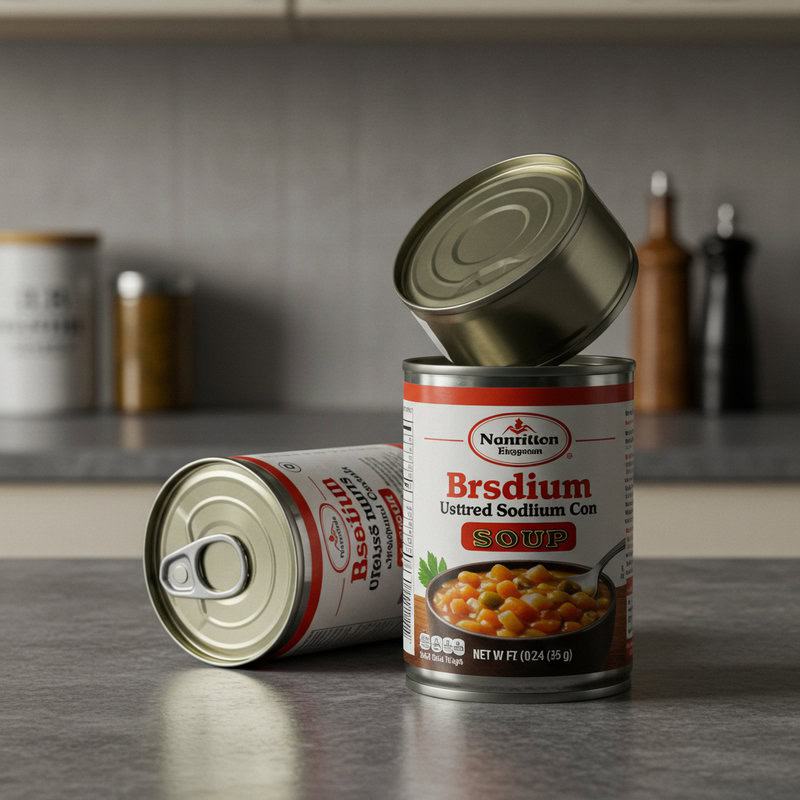
Canned soups are a convenient meal option but are often loaded with sodium, which can negatively affect gut health and overall well-being. High sodium intake has been shown to increase inflammation within the digestive tract, disrupt fluid balance, and potentially damage the gut lining over time. According to the Centers for Disease Control and Prevention (CDC), canned soups are among the top sources of dietary sodium, sometimes containing more than half of the recommended daily limit in a single serving.
In contrast, homemade soups allow for more precise control over sodium content and the inclusion of fresh, nutrient-rich ingredients such as vegetables, lean proteins, and whole grains. For those seeking convenience without the high salt load, low-sodium or reduced-sodium canned soup options are available in most grocery stores—just be sure to check nutrition labels carefully. Rinsing canned beans or vegetables before adding them to soups can further reduce sodium content. For more information about sodium in processed foods and how to make healthier choices, visit the American Heart Association’s sodium guidelines.
22. Pastries and Sweets

Pastries and sweets, such as donuts, croissants, cakes, and cookies, are loaded with refined sugars and unhealthy fats that can disrupt gut health. The high sugar content in these treats fuels the growth of harmful gut bacteria and may encourage inflammation throughout the digestive tract. Additionally, the combination of saturated and trans fats commonly found in pastries can slow digestion and increase the risk of gastrointestinal discomfort, including bloating and indigestion. According to the Harvard T.H. Chan School of Public Health, excessive intake of added sugars is linked to a range of metabolic and gut health issues.
Compared to pastries, snacks made from whole fruits—such as apple slices, fresh berries, or homemade fruit bars—provide natural sugars along with fiber, vitamins, and antioxidants that support a balanced gut microbiome. Gastroenterologists recommend reserving pastries and sweets for occasional indulgences rather than daily consumption. When cravings strike, opt for smaller portions or healthier alternatives that incorporate whole grains or natural sweeteners. For more guidance on making gut-friendly snack choices, visit the CDC’s guide to limiting added sugars.
23. Popcorn (with Artificial Butter)

Popcorn is often considered a healthy snack when prepared simply, but microwave varieties coated in artificial butter and flavors can pose problems for gut health. The artificial flavorings and preservatives commonly found in these products, such as diacetyl, can act as potential gut irritants and may disrupt the digestive process, particularly in those with sensitive stomachs. Some microwave popcorn bags also contain additives and trans fats that have been linked to inflammation and negative effects on the gut microbiome. According to the U.S. Food and Drug Administration (FDA), certain artificial additives are best consumed in moderation or avoided altogether.
Air-popped popcorn, on the other hand, is free of artificial additives and is high in fiber, making it a gut-friendly snack choice. To enhance flavor without compromising gut health, consider natural toppings like olive oil, nutritional yeast, or a sprinkle of herbs and spices. These alternatives not only add taste but also provide additional nutrients. For more information on healthy snack preparation and the concerns with artificial additives, visit the Academy of Nutrition and Dietetics’ popcorn guide.
24. Raw Onions
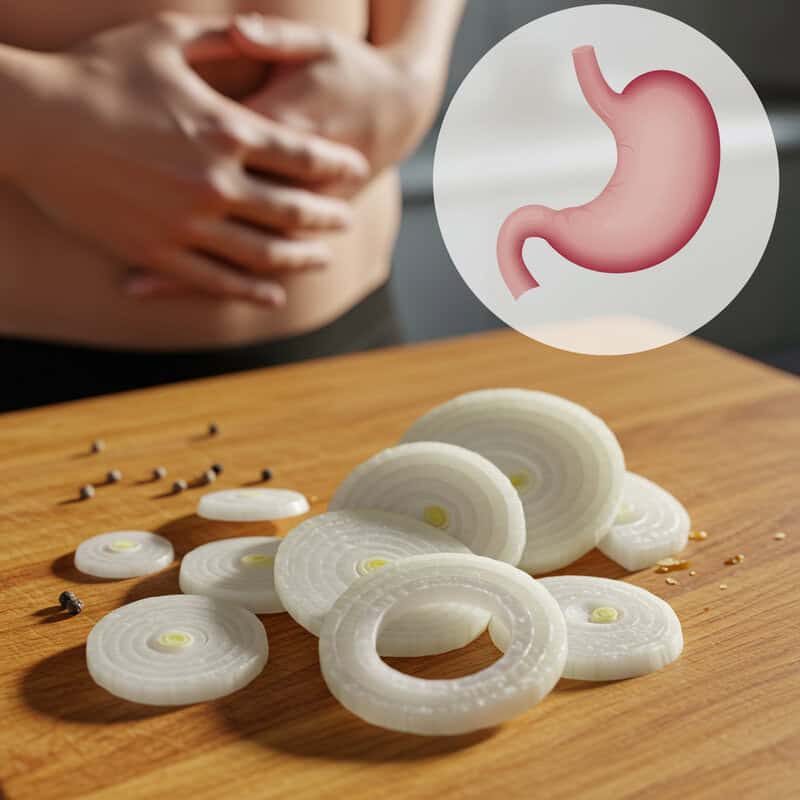
Raw onions are a common trigger for digestive discomfort due to their high content of fermentable fibers known as fructans. These fibers are part of a group of carbohydrates called FODMAPs, which can be poorly absorbed in the small intestine and rapidly fermented by gut bacteria in the colon. This fermentation often leads to gas, bloating, and abdominal pain, especially in individuals with irritable bowel syndrome (IBS) or sensitive stomachs. According to Monash University, onions are one of the highest sources of FODMAPs among vegetables.
Cooking onions significantly reduces their FODMAP content, making them easier on the digestive system. Roasting, sautéing, or simmering onions allows many people to enjoy their flavor without the uncomfortable side effects associated with eating them raw. For those who are especially sensitive, using the green tops of scallions or infusing oils with onion flavor can offer a gentler alternative. For more information on FODMAPs and how to prepare gut-friendly meals, visit the Monash FODMAP resource.
25. Garlic (in Excess)
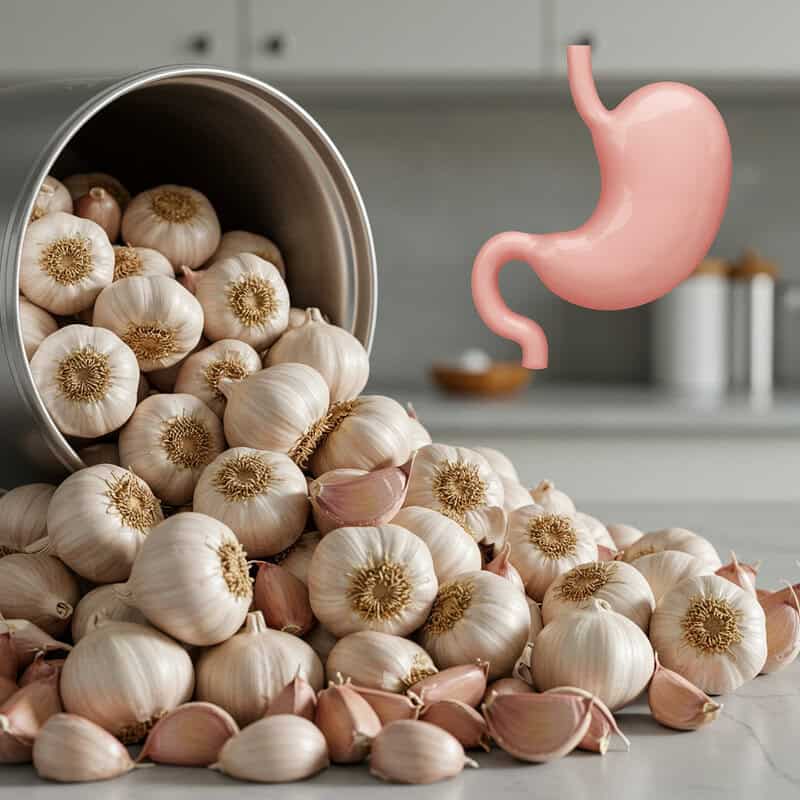
Garlic is widely used for its flavor and potential health benefits, but it contains high levels of FODMAPs—specifically, fructans—which can trigger gut symptoms in sensitive individuals. When consumed in excess, garlic can cause bloating, gas, abdominal pain, and changes in bowel habits, particularly for those with irritable bowel syndrome (IBS) or other functional gut disorders. Studies from Monash University indicate that garlic is one of the most potent sources of FODMAPs in the diet.
Raw garlic tends to have a more pronounced effect on the digestive system than cooked or roasted garlic. Cooking can reduce the concentration of FODMAPs, making it easier to tolerate in moderate amounts. For those who are highly sensitive, infusing oils with garlic flavor (without the actual garlic pieces) is a helpful way to enjoy the taste without the gut discomfort. Gastroenterologists recommend being mindful of portion size and gradually testing tolerance levels. For more information on garlic, FODMAPs, and how to manage symptoms, consult the Monash FODMAP resource.
26. Beans (for Sensitive Individuals)

Beans are a rich source of plant-based protein and fiber, but they also contain fermentable oligosaccharides, a type of FODMAP that can cause digestive issues for sensitive individuals. When these carbohydrates reach the colon, they are rapidly fermented by gut bacteria, resulting in gas, bloating, and discomfort—especially for those with irritable bowel syndrome (IBS) or similar sensitivities. According to Monash University, different varieties of beans contain varying levels of FODMAPs, with black beans typically being higher and lentils generally lower, especially when cooked and rinsed thoroughly.
For those who are sensitive but want to include beans in their diet, soaking dried beans overnight and discarding the soaking water before cooking can help reduce oligosaccharide content. Gradually introducing small portions of beans and choosing lower-FODMAP varieties like lentils or canned chickpeas (rinsed well) can also minimize digestive distress. Monitoring portion size and increasing fiber intake slowly allows the gut to adapt. For further advice on incorporating beans into a gut-friendly diet, visit the Monash FODMAP resource.
27. Cruciferous Vegetables (Raw)

Cruciferous vegetables, such as broccoli, cabbage, cauliflower, and Brussels sprouts, are rich in fiber and sulfur-containing compounds. While these nutrients are beneficial for many people, consuming these vegetables raw can lead to excessive gas, bloating, and abdominal discomfort—especially for those with sensitive digestive systems or irritable bowel syndrome (IBS). The high fiber content and natural sugars in raw cruciferous vegetables are fermented by gut bacteria, producing gas as a byproduct. Additionally, sulfur compounds can contribute to the characteristic odor and increase digestive symptoms.
Cooking cruciferous vegetables helps break down tough fibers and sulfur compounds, making them easier to digest and gentler on the gut. Steaming, roasting, or sautéing these vegetables not only enhances their digestibility but also retains most of their nutritional benefits. According to the American Gastroenterological Association, individuals prone to bloating may find cooked cruciferous vegetables more tolerable than raw. Gradually introducing these vegetables and starting with small portions can also help the digestive system adjust. For more guidance on incorporating fiber-rich vegetables without discomfort, visit the AGA’s healthy eating resource.
28. Artificial Food Coloring
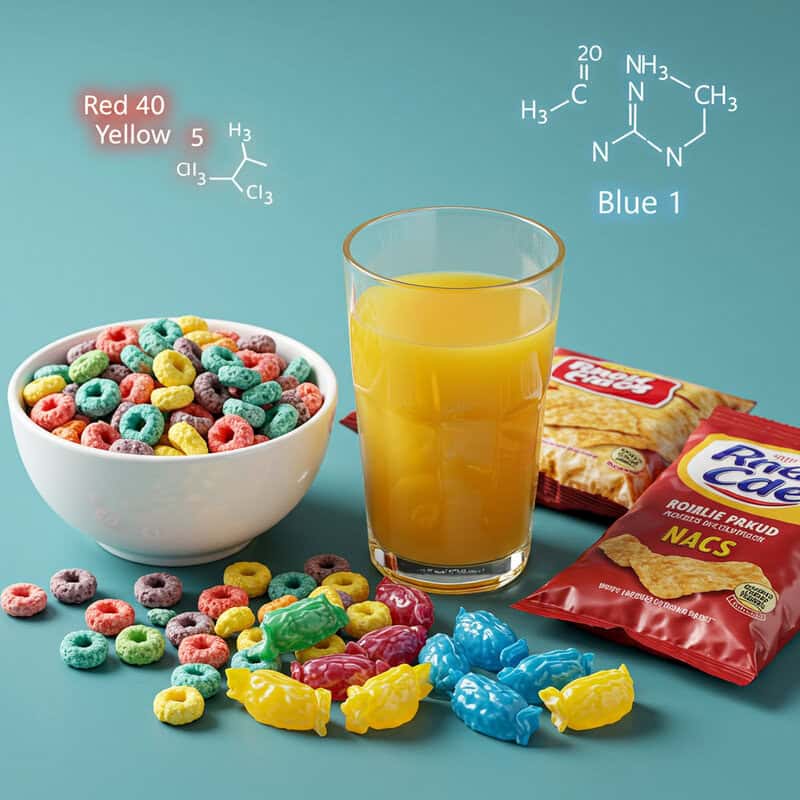
Artificial food colorings, such as Red 40, Yellow 5, and Blue 1, are commonly added to cereals, candies, beverages, and processed snacks to enhance visual appeal. Gastroenterologists may avoid these additives due to controversial research suggesting potential links between artificial colorings and gut inflammation, allergic reactions, or disruptions in the gut microbiome, especially in sensitive children and adults. While conclusive evidence is still emerging, some studies, including those referenced by the U.S. Food and Drug Administration (FDA), highlight ongoing safety evaluations and note that certain individuals may experience adverse effects.
Foods with bright artificial colors—such as rainbow cereals, neon candies, or vividly colored drinks—contrast sharply with naturally colored foods like berries, carrots, or leafy greens, which offer beneficial nutrients without synthetic additives. Gastroenterologists recommend reading ingredient labels carefully to spot artificial colorings, which can be listed by their number or chemical name. Opting for foods that use natural coloring agents, such as beet juice or turmeric, can reduce exposure to synthetic dyes. For more information on artificial food colorings and their potential effects, visit the Center for Science in the Public Interest’s food dyes resource.
29. Flavored Yogurts (with Added Sugar)
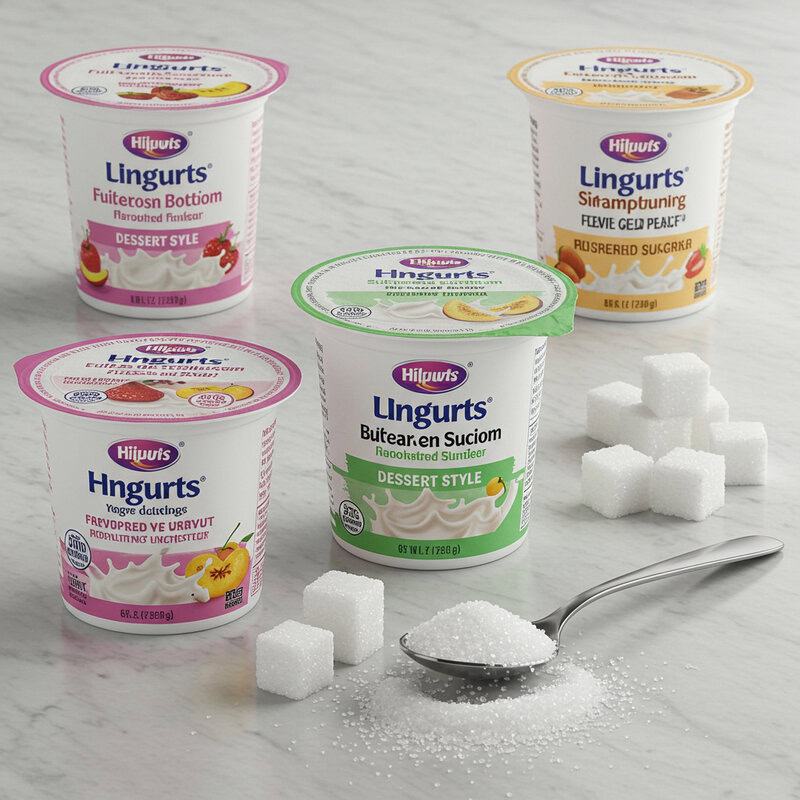
Flavored yogurts, especially those labeled as “fruit-on-the-bottom” or “dessert-style,” often contain significant amounts of added sugar that can undermine the gut health benefits typically associated with yogurt. While yogurt is naturally rich in probiotics and can support a healthy microbiome, the addition of hidden sugars can promote the growth of less beneficial gut bacteria, contribute to inflammation, and increase the risk of metabolic issues. According to the Centers for Disease Control and Prevention (CDC), some flavored yogurts contain as much sugar per serving as a candy bar.
In contrast, plain yogurt—whether regular, Greek, or skyr—contains minimal or no added sugars and allows you to control sweetness and flavors. Adding your own fresh fruit, a drizzle of honey, or a sprinkle of nuts provides natural sweetness and additional nutrients without overwhelming your gut with excess sugar. Gastroenterologists recommend opting for unsweetened or low-sugar yogurt varieties and carefully reading nutrition labels to check for hidden sugars. For more tips on making gut-friendly dairy choices, visit the Harvard T.H. Chan School of Public Health’s yogurt guide.
30. Potato Chips

Potato chips are a popular snack, but they are typically high in unhealthy fats and extremely low in fiber—two factors that make them a poor choice for gut health. Fried chips, in particular, contain saturated and trans fats that can slow digestion, promote inflammation, and contribute to gastrointestinal discomfort such as bloating or acid reflux when eaten in excess. The lack of dietary fiber in standard potato chips means they do little to support beneficial gut bacteria or healthy bowel movements. According to the Harvard T.H. Chan School of Public Health, regular consumption of high-fat, low-fiber snacks is linked to negative effects on both digestion and overall health.
Baked chips generally contain less fat than traditional fried varieties, but they are still processed and often high in sodium, which can also impact gut function. Gastroenterologists recommend practicing portion control and considering healthier alternatives, such as air-popped popcorn, roasted chickpeas, or sliced vegetables with hummus. Reading nutrition labels and choosing snacks with higher fiber and lower fat content can help promote better gut health. For more guidance on smart snacking, visit the CDC’s healthy snacking resource.
31. White Rice (in Excess)
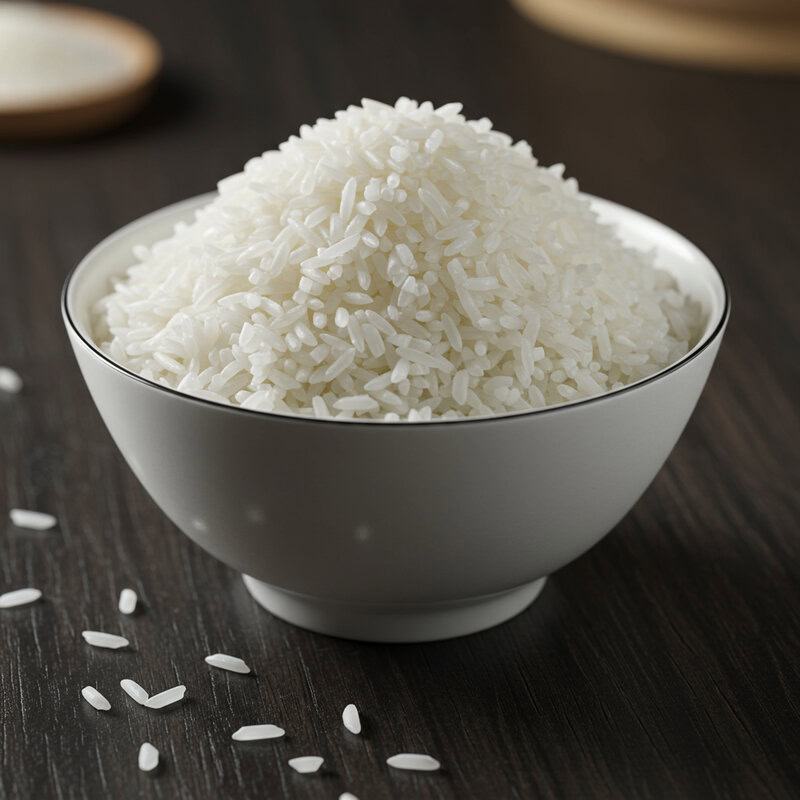
White rice is a staple food in many diets worldwide, but it is considered a refined carbohydrate because its bran and germ are removed during processing. This stripping of natural fiber and nutrients leaves white rice with a high glycemic index, meaning it is quickly digested and can cause rapid spikes in blood sugar. Regularly consuming white rice in excess offers little fiber to support beneficial gut bacteria and can contribute to constipation or other digestive imbalances. According to the Harvard T.H. Chan School of Public Health, diets high in refined grains like white rice are linked to a higher risk of metabolic and digestive issues.
In contrast, brown rice and other whole grains, such as quinoa or barley, retain their fiber-rich outer layers and offer more vitamins, minerals, and antioxidants. These whole grains help support a balanced gut microbiome and promote regularity. Gastroenterologists recommend swapping white rice for whole grain options whenever possible and gradually increasing whole grain intake to allow the digestive system to adapt. For more information on making healthier grain choices, visit the ChooseMyPlate.gov grains resource.
32. Soy Sauce (High Sodium)

Soy sauce is a flavorful staple in many cuisines, but its high sodium content can pose risks for gut health and overall well-being. A single tablespoon of regular soy sauce can contain over 900 milligrams of sodium—nearly 40% of the recommended daily limit. Excess sodium intake is known to increase inflammation, disrupt fluid balance, and potentially irritate the gut lining, particularly for individuals with sensitive digestive systems or conditions like hypertension. According to the Centers for Disease Control and Prevention (CDC), soy sauce is among the top contributors to dietary sodium in the average diet.
Low-sodium soy sauce provides a similar umami flavor with about 40% less sodium, making it a better option for those aiming to limit salt intake. Gastroenterologists recommend using soy sauce sparingly, opting for low-sodium varieties, and balancing meals with fresh vegetables and whole grains to dilute sodium’s effects. Alternatively, flavoring foods with herbs, spices, or citrus juice can reduce reliance on salty condiments. For more information on sodium in condiments and strategies for reducing intake, visit the American Heart Association’s sodium guidelines.
33. Dried Fruit (with Added Sugar)

Dried fruit can be a convenient and nutrient-dense snack, but many commercial varieties are coated in added sugar to enhance flavor and shelf appeal. This extra sugar not only increases total calorie intake but can also disrupt the balance of gut bacteria and promote gastrointestinal upset, such as bloating and diarrhea, especially when consumed in large quantities. According to the Centers for Disease Control and Prevention (CDC), added sugars are a major contributor to metabolic and digestive issues.
Unsweetened dried fruits, such as plain raisins, apricots, or figs, provide natural sugars along with fiber, vitamins, and minerals, making them a healthier choice for gut health. However, even unsweetened dried fruit should be eaten in moderation, as its concentrated sugars and fiber can cause digestive discomfort for some sensitive individuals. Gastroenterologists recommend carefully reading ingredient labels to avoid added sugars, syrups, or preservatives commonly found in packaged dried fruit. For more guidance on selecting naturally sweet snacks and understanding sugar content in foods, visit the Harvard T.H. Chan School of Public Health’s resource on added sugar.
34. Cereal Bars
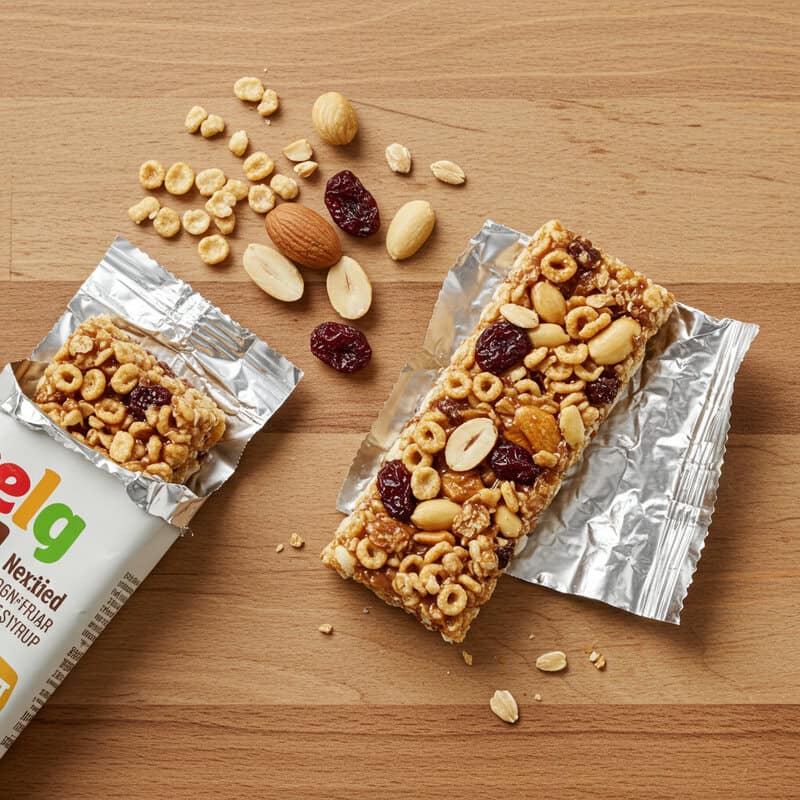
Cereal bars are often marketed as convenient and healthy snacks, but many varieties are packed with processed ingredients, added sugars, and artificial flavors that can undermine gut health. These bars frequently contain refined grains, high-fructose corn syrup, and little dietary fiber, making them closer to candy bars than nutritious snacks. High sugar content can feed less beneficial gut bacteria and contribute to inflammation, while the lack of fiber fails to support a healthy digestive system. According to the Harvard T.H. Chan School of Public Health, consuming too many processed, sugary snacks is linked to metabolic and gastrointestinal problems.
Whole fruit, by comparison, provides natural sweetness, fiber, vitamins, and antioxidants that nourish the gut microbiome and promote regular digestion. When seeking healthier snack alternatives, consider unsweetened dried fruits, raw nuts, seeds, or homemade bars made from oats and natural sweeteners like dates or honey. Always read ingredient labels carefully and opt for products with minimal added sugars and whole food ingredients. For more guidance on choosing snacks that support digestive health, visit the CDC’s healthy snacking resource.
35. Pizza (with Processed Toppings)

Pizza is a beloved comfort food, but when loaded with processed toppings such as pepperoni, sausage, and extra cheese, it can be detrimental to gut health. Processed meats are high in sodium, preservatives, and saturated fats, which can disrupt the balance of gut bacteria, promote inflammation, and increase the risk of digestive discomfort. Cheeses used in excess can add to the fat and sodium content, especially for those who are lactose intolerant or sensitive to dairy. According to the American Cancer Society, frequent consumption of processed meats is associated with a higher risk of colorectal cancer and digestive issues.
Vegetable-based pizzas, on the other hand, provide fiber, antioxidants, and less saturated fat, making them a more gut-friendly option. Swapping meat toppings for a variety of colorful vegetables—such as peppers, onions, spinach, or mushrooms—can enhance both flavor and nutrition. Choosing whole grain crusts and lighter cheese portions can further support digestive health. For more information on making healthier pizza choices, visit the Academy of Nutrition and Dietetics’ guide to eating out healthfully.
36. Margarine (Trans Fats)
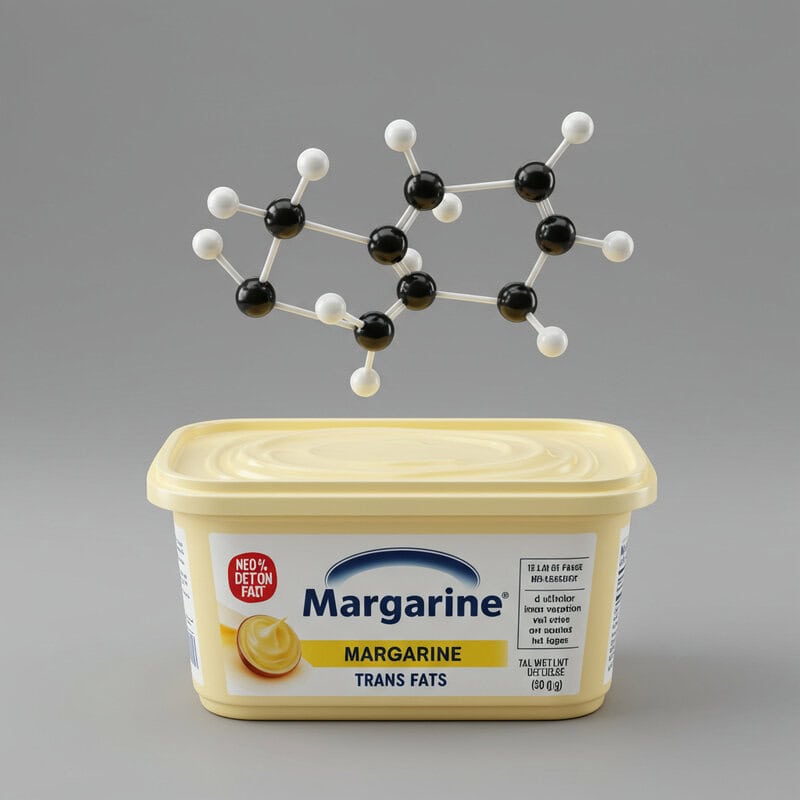
Margarine was once promoted as a healthier alternative to butter, but many traditional margarines are made with partially hydrogenated oils, which are a primary source of artificial trans fats. Trans fats are known to increase inflammation throughout the body, disrupt the gut microbiota, and raise the risk of cardiovascular disease. According to the U.S. Food and Drug Administration (FDA), consumption of trans fats is associated with negative effects on both digestive and overall health, prompting regulations to limit their use in food products.
Butter, while higher in saturated fat, does not contain trans fats naturally. Some studies suggest that moderate consumption of natural fats is less harmful than ingesting artificial trans fats. For those looking to avoid trans fats, it is essential to read ingredient labels carefully—look for products labeled “trans-fat-free” or check for the absence of partially hydrogenated oils. Plant-based spreads made with healthy oils like olive, avocado, or canola are often better options. For more information on trans fats, inflammation, and healthier spread choices, visit the American Heart Association’s guide to healthy cooking oils.
37. Instant Noodles

Instant noodles are a convenient and inexpensive meal, but they are often packed with preservatives, artificial flavors, and high levels of sodium. Many brands contain tertiary-butylhydroquinone (TBHQ), a preservative that can irritate the digestive tract and potentially disrupt the gut microbiome when consumed regularly. The sodium content in a single serving of instant noodles can exceed half of the recommended daily limit, increasing the risk of bloating, fluid retention, and hypertension. According to the Centers for Disease Control and Prevention (CDC), processed noodle products are among the leading sources of dietary sodium.
In contrast, whole-grain or legume-based pastas provide more fiber, protein, and nutrients, offering better support for gut health and regular digestion. Homemade noodle dishes allow for greater control over ingredients, enabling the use of fresh vegetables, lean proteins, and low-sodium broths. Gastroenterologists suggest limiting instant noodle consumption and opting for nutritious, homemade alternatives whenever possible. For more information on making healthier choices and the potential impacts of processed foods on the gut, visit the Harvard T.H. Chan School of Public Health’s processed foods resource.
38. Frozen Dinners
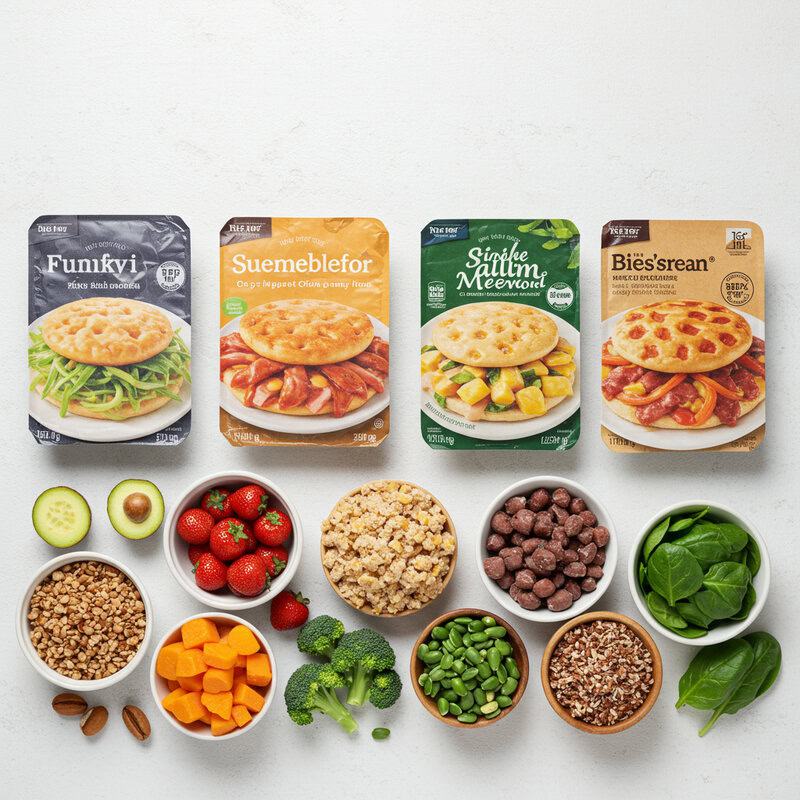
Frozen dinners are a popular convenience food, but many varieties are high in preservatives, sodium, and unhealthy fats while lacking fiber and essential nutrients. Preservatives and artificial additives, commonly used to prolong shelf life, can irritate the digestive tract and may alter the balance of gut bacteria when consumed frequently. The sodium content in a single frozen meal often exceeds 30-50% of the recommended daily limit, which can contribute to bloating, fluid retention, and hypertension. Additionally, the low fiber content fails to nourish beneficial gut bacteria or support regular digestion. According to the Centers for Disease Control and Prevention (CDC), frozen meals are a major source of hidden sodium in the American diet.
Fresh, home-cooked meals typically contain more fiber, vitamins, and minerals, and allow for better control over the use of preservatives and sodium. Meal prepping—planning and preparing meals in advance—can help busy individuals enjoy healthy, gut-friendly options throughout the week. Incorporating whole grains, fresh vegetables, and lean proteins into homemade dishes supports digestive and overall health. For more tips on reducing processed food intake and meal prepping, visit the Academy of Nutrition and Dietetics’ meal prep resource.
39. Store-Bought Muffins

Store-bought muffins may seem like a convenient breakfast or snack, but they are typically high in added sugars, unhealthy fats, and refined flours. Many commercial muffins contain as much sugar as a cupcake and are often made with hydrogenated oils or butter, contributing to excess calories and minimal nutritional value. The combination of high sugar and fat content can disrupt gut health by promoting inflammation and feeding less beneficial gut bacteria. According to the Harvard T.H. Chan School of Public Health, excessive consumption of added sugars and processed fats is linked to metabolic and digestive issues.
Homemade muffins can be made with whole grain flours, reduced sugar, and healthy fats like olive oil or mashed banana, making them a much better option for gut health. Adding fruits, nuts, or seeds increases fiber content and provides additional nutrients. For those seeking healthier recipes, many dietetic organizations offer lower-sugar, whole grain muffin recipes online. For more ideas on baking gut-friendly muffins and understanding the health impact of store-bought baked goods, visit the Academy of Nutrition and Dietetics’ healthy muffin makeovers.
40. Pickled Meats

Pickled meats, such as pickled sausages, corned beef, and certain deli meats, are preserved using high concentrations of salt, vinegar, and chemical additives. These products are often loaded with sodium and preservatives like nitrates and nitrites, which can disrupt gut health by promoting inflammation, increasing blood pressure, and upsetting the balance of gut bacteria. According to the American Cancer Society, regular consumption of processed and pickled meats is also associated with a higher risk of colorectal cancer and other digestive issues.
In contrast, fresh, unprocessed meats do not contain these high levels of sodium and chemical preservatives, making them a healthier option for maintaining optimal gut health. Gastroenterologists recommend minimizing the intake of pickled and processed meats and opting for fresh cuts prepared with simple seasonings or herbs. If consumed, pickled meats should be enjoyed only occasionally and in small portions. For more information about the health risks of processed and pickled meats and tips on making healthier choices, visit the World Cancer Research Fund’s guide on red and processed meat.
41. Mayonnaise-Based Salads

Mayonnaise-based salads, such as potato salad, coleslaw, and macaroni salad, are often found at delis and gatherings. These salads typically contain large amounts of mayonnaise, which is high in saturated fat and calories. Many commercial mayonnaise varieties also include preservatives and additives that can affect gut health, contributing to inflammation and, in some cases, digestive discomfort—especially if consumed frequently or in large portions. According to the Harvard T.H. Chan School of Public Health, excessive intake of saturated and processed fats is associated with poor metabolic and digestive outcomes.
In contrast, vinegar-based salads use lighter dressings, often made with olive oil, vinegar, and herbs, which are lower in saturated fat and free from preservatives. These alternatives provide flavor without overwhelming the digestive system and can even support gut health due to the beneficial effects of vinegar. Gastroenterologists recommend choosing or preparing salads with lighter, homemade vinaigrettes and adding fiber-rich ingredients like vegetables, beans, or whole grains. For more ideas on making healthier salads and understanding the impact of different dressings, visit the Academy of Nutrition and Dietetics’ salad dressing tips.
42. Chocolate (with High Sugar)

Chocolate, especially milk chocolate and many commercially available chocolate bars, often contains high amounts of added sugar and fat. This excess sugar not only contributes to blood sugar spikes but can also disrupt the gut microbiome, feed harmful bacteria, and promote inflammation in the digestive tract. According to the Harvard T.H. Chan School of Public Health, frequent consumption of high-sugar foods is associated with metabolic and gastrointestinal issues, making them a poor choice for gut health.
Dark chocolate with a high cocoa content (70% or higher) generally contains less sugar and more beneficial antioxidants, making it a better option for those wishing to enjoy chocolate without harming digestive health. However, even dark chocolate should be eaten in moderation, as it can still contain added sugars and fats. Gastroenterologists recommend checking labels and opting for chocolate varieties with the least added sugar or enjoying small amounts of dark chocolate as an occasional treat. For more guidance on chocolate choices and their health effects, visit the CDC’s guide to limiting added sugars.
43. Sports Drinks

Sports drinks, while marketed as hydrating beverages for athletes, are often loaded with added sugars, artificial flavors, and food dyes. The high sugar content in many sports drinks can quickly surpass daily recommended limits, fueling the growth of harmful gut bacteria and potentially leading to digestive upset, such as bloating or diarrhea. In addition to sugar, these drinks frequently contain artificial additives that may disrupt the gut microbiome or cause sensitivity in some individuals. According to the Centers for Disease Control and Prevention (CDC), sugary drinks are a leading source of added sugar in the American diet.
For most people engaged in regular daily activities or even moderate exercise, plain water is the best choice for hydration. Natural hydration can also be achieved by infusing water with fresh fruit, cucumber, or herbs for added flavor without sugar or additives. Coconut water is another option, offering electrolytes with less sugar than most commercial sports drinks. Gastroenterologists recommend reserving sports drinks for prolonged, intense physical exertion and choosing low- or no-sugar varieties if needed. For more information on healthy hydration, visit the Harvard Nutrition Source’s healthy drinks guide.
44. Flavored Coffees

Flavored coffees, such as those found at coffee shops or pre-packaged bottled drinks, often contain high amounts of added sugars, sweetened syrups, and artificial flavors. These ingredients can quickly turn a simple cup of coffee into a calorie-dense beverage that disrupts gut health by fueling less beneficial bacteria, promoting inflammation, and potentially causing digestive upset for sensitive individuals. According to the Centers for Disease Control and Prevention (CDC), specialty coffees and sweetened beverages are significant sources of hidden sugars in the modern diet.
In contrast, black coffee contains no sugar or artificial additives and is generally well tolerated by most people when consumed in moderation. For those seeking flavor without excess sugar, consider adding a splash of milk or a sprinkle of cinnamon, nutmeg, or cocoa powder. Choosing regular brewed coffee or espresso and customizing sweetness and flavors at home allows for better control over ingredients. Gastroenterologists recommend limiting flavored coffees and opting for cleaner brews to protect gut health and avoid unnecessary sugar intake. For more guidance on healthy coffee habits, visit the Harvard T.H. Chan School of Public Health’s coffee resource.
45. Breaded Fried Foods

Breaded fried foods, including items like fried chicken, mozzarella sticks, and breaded fish, are known for their heavy, greasy texture and high calorie content. The combination of refined flour coatings and deep frying in oils introduces excessive saturated fats and sometimes trans fats, both of which can slow digestion, increase gut inflammation, and lead to bloating, heartburn, or indigestion. Additionally, the breading itself is typically made from refined grains, offering little fiber or nutritional benefit for gut health. According to the Cleveland Clinic, frequent consumption of fried foods is linked to a higher risk of gastrointestinal discomfort and chronic digestive issues.
Grilled foods, by contrast, are cooked without added breading or excessive fat, making them lighter and easier to digest. Grilling or baking proteins and vegetables allows natural flavors to shine while preserving nutrients and reducing gut strain. Gastroenterologists recommend swapping breaded fried foods for grilled or oven-baked versions, using herbs, spices, or citrus for flavor. For more tips on preparing gut-friendly meals and the health impact of different cooking methods, visit the Academy of Nutrition and Dietetics’ guide to healthy cooking methods.
46. Sweetened Breakfast Cereals

Sweetened breakfast cereals, especially those marketed to children, often contain high amounts of added sugars and very little fiber. Consuming these cereals regularly can lead to blood sugar spikes, fuel the growth of less beneficial gut bacteria, and contribute to inflammation and digestive discomfort. According to the Harvard T.H. Chan School of Public Health, many breakfast cereals contain as much sugar per serving as desserts, making them a poor choice for gut health and overall nutrition.
Oatmeal, on the other hand, is naturally high in fiber and free from added sugars when prepared plain. The fiber in oats supports the growth of healthy gut bacteria, promotes regular bowel movements, and provides a steady release of energy. To make healthier breakfast choices, gastroenterologists recommend reading nutrition labels to identify cereals with minimal added sugars (preferably less than 5 grams per serving) and at least 3 grams of fiber per serving. Consider adding fresh fruit, nuts, or seeds to plain oatmeal or low-sugar whole grain cereals for extra flavor and nutrition. For more tips on choosing gut-friendly breakfast options, visit the CDC’s healthy cereal guide.
47. Salad Dressings (with Additives)
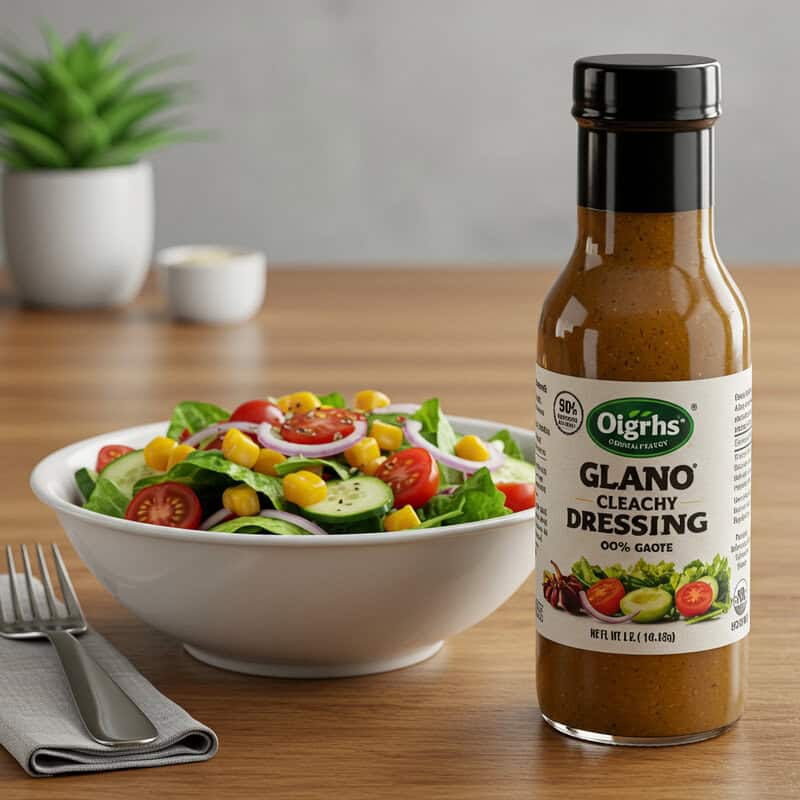
Bottled salad dressings often contain a variety of additives, including emulsifiers, stabilizers, preservatives, and added sugars, all of which can negatively impact gut health. Emulsifiers such as polysorbate 80 and carboxymethylcellulose have been shown in some studies to disrupt the gut microbiome and promote inflammation in the intestinal lining. In addition, many commercial dressings are high in added sugars and unhealthy fats, which can further contribute to metabolic and digestive problems. According to the Harvard T.H. Chan School of Public Health, it’s important to limit processed sauces and dressings in favor of more natural options.
Homemade salad dressings give you control over the ingredients, allowing you to avoid unnecessary additives and excess sugar. A simple mix of olive oil, vinegar or lemon juice, herbs, and spices provides flavor while supporting gut health with healthy fats and antioxidants. For those who prefer store-bought options, carefully read labels to select dressings with minimal ingredients and no added sugars or artificial emulsifiers. For more tips on making gut-friendly dressings at home, visit the Academy of Nutrition and Dietetics’ healthy salad dressing tips.
48. Milkshakes

Milkshakes, often made with ice cream, whole milk, and sweet syrups, are loaded with added sugars and unhealthy fats. A large milkshake can contain more sugar than a can of soda and significant amounts of saturated fat, both of which can negatively affect gut health. Excessive sugar can disrupt the balance of gut bacteria, feed harmful microbes, and contribute to inflammation and digestive discomfort, especially for those who are lactose intolerant. According to the Centers for Disease Control and Prevention (CDC), sugar-sweetened beverages like milkshakes are a leading source of added sugars in the diet.
Smoothies made at home with fresh or frozen fruit, unsweetened yogurt or plant-based milk, and no added sugars are a much lighter and gut-friendly alternative. These options provide fiber, vitamins, and antioxidants, supporting a healthy digestive system. Gastroenterologists recommend limiting milkshake consumption and opting for smoothies or lighter recipes that use natural sweeteners, such as a small amount of honey or ripe banana. For more healthy beverage ideas and recipes, visit the Harvard T.H. Chan School of Public Health’s healthy drinks guide.
49. Sourdough (for Gluten Sensitive)
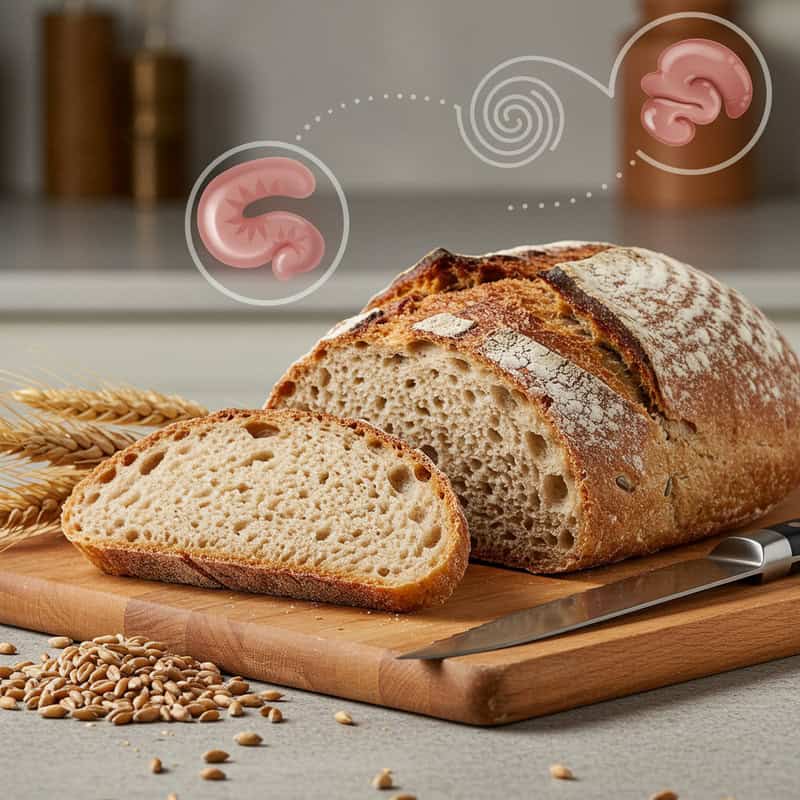
Sourdough bread, while often touted for its easier digestibility due to natural fermentation, still contains gluten—a protein that can trigger gut symptoms in people with celiac disease or non-celiac gluten sensitivity. For these individuals, consuming sourdough made from wheat, barley, or rye may result in bloating, abdominal pain, diarrhea, or other digestive discomforts. The fermentation process does break down some gluten and FODMAPs, which may make sourdough more tolerable for some, but it does not eliminate gluten entirely. According to the Celiac Disease Foundation, anyone with celiac disease or severe sensitivity should avoid traditional sourdough bread.
Gluten-free sourdough options, made from grains such as rice, buckwheat, or millet, are available and offer a safer alternative for those with gluten intolerance. Gastroenterologists recommend individuals who suspect gluten sensitivity to test their tolerance under medical supervision and to choose certified gluten-free products when needed. For more information on gluten sensitivity, the effects of sourdough, and suitable bread alternatives, visit the Celiac Disease Foundation’s gluten-free living resource.
50. Granola (with Added Sugar)
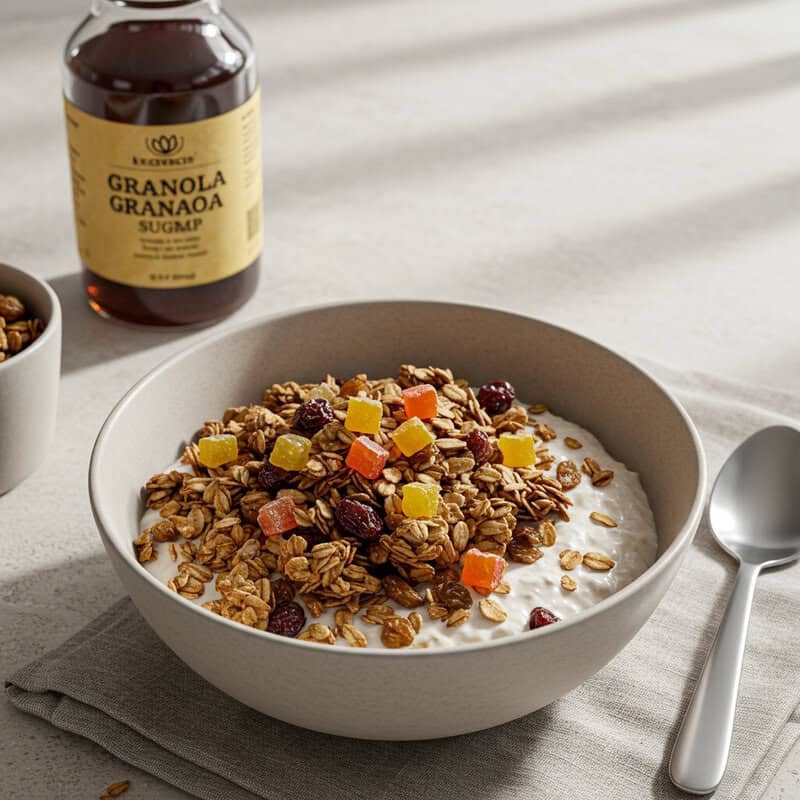
Granola is often marketed as a healthy breakfast or snack, but many commercial varieties are packed with hidden added sugars, syrups, and sweetened dried fruit. These sugars can quickly add up, turning what might seem like a nutritious choice into a source of excess calories and a contributor to blood sugar spikes. High sugar intake can disrupt the gut microbiome, feed less beneficial bacteria, and contribute to inflammation, especially if consumed regularly. According to the Centers for Disease Control and Prevention (CDC), many breakfast granolas contain as much added sugar per serving as some desserts.
Homemade granola allows for better control over the amount and type of sweetener used, and can be made with whole oats, nuts, seeds, and a small amount of honey or maple syrup, if any. Unsweetened or low-sugar recipes provide fiber and healthy fats to support gut health without the drawbacks of commercial, sugar-laden varieties. Gastroenterologists recommend reading ingredient labels closely when purchasing granola and choosing brands with minimal or no added sugars. For more tips on making gut-friendly granola, visit the Harvard T.H. Chan School of Public Health’s healthy granola recipes.
Conclusion
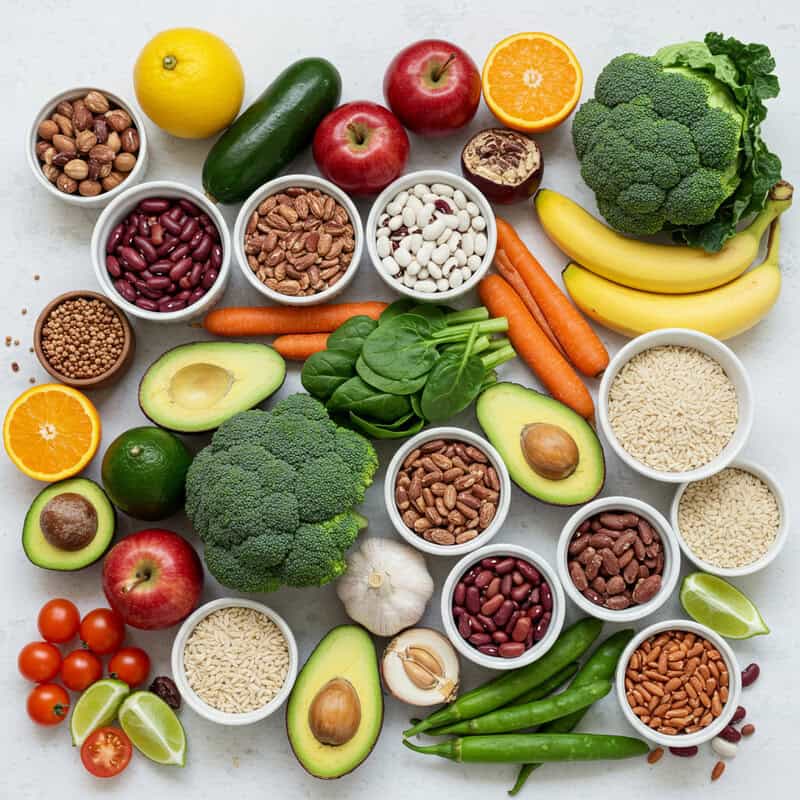
Maintaining gut health requires vigilance and thoughtful choices about the foods we eat. By recognizing and limiting foods that gastroenterologists commonly avoid, individuals can make practical changes that support a healthier digestive system. Opting for whole, minimally processed foods and reading ingredient labels are simple yet effective strategies for protecting gut function. If digestive symptoms persist or worsen despite these changes, it’s important to consult a healthcare provider for screening and personalized guidance. For more information on digestive health and nutrition, visit the American Gastroenterological Association’s GI Patient Center.
Disclaimer
The information provided in this article is for general informational purposes only. While we strive to keep the information up-to-date and correct, we make no representations or warranties of any kind, express or implied, about the completeness, accuracy, reliability, suitability, or availability with respect to the article or the information, products, services, or related graphics contained in the article for any purpose. Any reliance you place on such information is therefore strictly at your own risk.
In no event will we be liable for any loss or damage including without limitation, indirect or consequential loss or damage, or any loss or damage whatsoever arising from loss of data or profits arising out of, or in connection with, the use of this article.
Through this article you are able to link to other websites which are not under our control. We have no control over the nature, content, and availability of those sites. The inclusion of any links does not necessarily imply a recommendation or endorse the views expressed within them.
Every effort is made to keep the article up and running smoothly. However, we take no responsibility for, and will not be liable for, the article being temporarily unavailable due to technical issues beyond our control.





